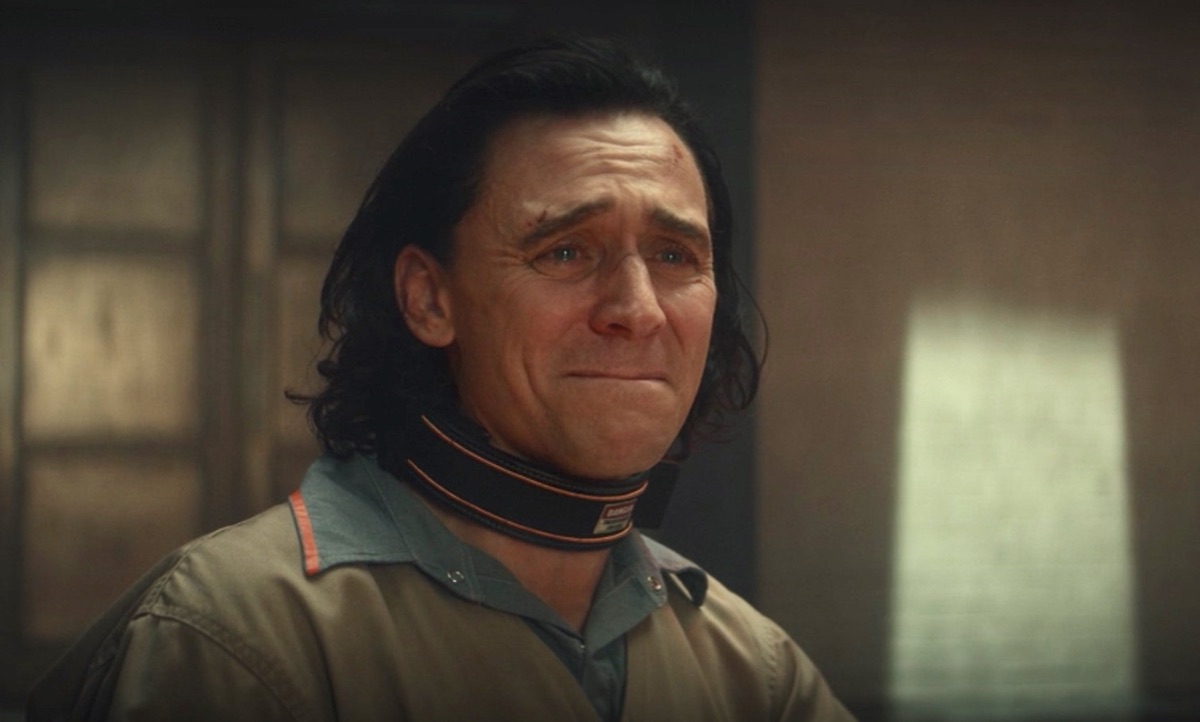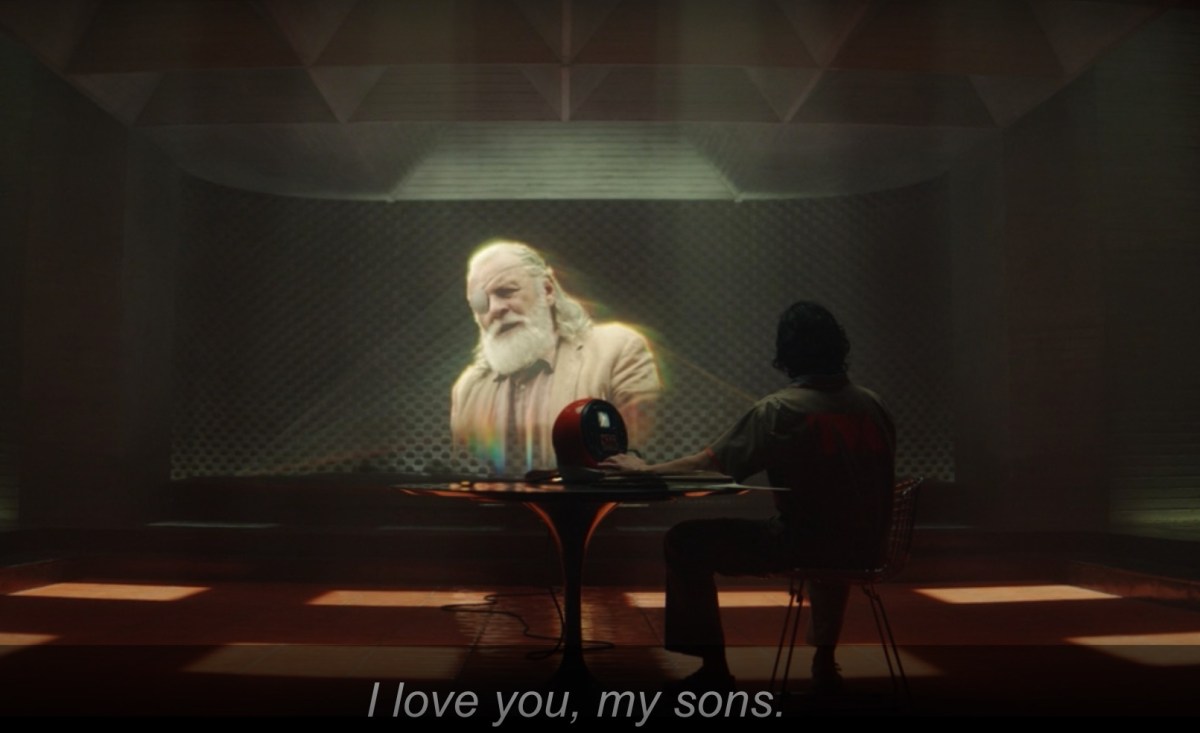Loki Gave Us Exactly the Reveal I Was Hoping For


I have a wishlist of elements from the Marvel movie canon and comics that I hope appear on Loki as we move forward. But in the show’s first episode, we received the exact scenes I’ve been crossing fingers and toes for months in fervent prayer that we would see play out. Did Loki writer Michael Waldron get his hands on my secret diary?
***Major spoilers for the first episode of Loki ahead***
Ever since a Loki trailer revealed that the Time Variance Authority had technology that could project scenes from the past, the future, and indeed from other timelines, I guessed this would be the method of catching Loki (and the audience) up to speed. The biggest problem going into the show for me was that this “Loki variant” wasn’t the original Loki—the Loki we’d evolved with over a long and winding arc in the MCU. Instead, he was Avengers-era Loki, recently a war criminal bent on taking over Earth.
When it first became clear this was Marvel Studios’ plan for Loki going forward, it seemed like a disappointing reset for the character. Loki finally had a good relationship with Thor again in Ragnarok, was acknowledged as a beloved son by Odin, and even named himself both the rightful king of Jotunheim and an Odinson as he sacrificed himself in Infinity War to save his brother’s life. He had at last reconciled those two opposing sides of himself. The death of his mother Frigga in The Dark World, which he blamed himself for, also deeply hurt and changed him. By Infinity War, we had a Loki far from his original path of villainy, back at his brother’s side and working to save what remained of Asgard. And then Thanos killed him.
But by showing the variant Loki the “highlights” of what had transpired with his counterpart, Loki quickly demonstrated that there are not such great differences between them. That our new Loki could process everything that happened to “him,” and emerge on the other side altered from it. It’s a bit of a sped-up transformation, but it makes perfect sense for the character.
We have to keep in mind that not all that much time has passed for this Loki variant since the events of Thor. He only recently discovered that his entire centuries-long life was based on a lie, and that he was not born an Asgardian but a Jotun, the sworn enemy of the people he was raised by. He was forced to grapple with the idea that he was, in his words, “the monster parents tell their children about at night.”
When his plans to overthrow Odin and Thor failed, Loki let go on the Bifrost bridge, dropping down into oblivion. But instead of dying, he encountered Thanos, who influenced him with the Mind Stone to increase his hatred and helped him try to conquer Earth in order to obtain the Tesseract/Space Stone. The Loki we meet at the beginning of Loki still imagines that he is a despised outcast and criminal on Asgard, an enemy to Thor, and scorned by his parents.
But then he is shown otherwise—and as a result, he seems able to access more profound truths about his own nature.
At first, Owen Wilson’s Agent Mobius only plays Loki scenes of his villainous actions and the tragedy of Frigga’s death in order to get under Loki’s skin and perhaps shock him out of his default bravado. There are few events that could impact Loki more than his adored mother being killed—with him sharing blame—and that’s the first time we see this Loki really emotionally moved. I had predicted that seeing Frigga’s death would prove transformative for this Loki. But the show exceeded my expectations, because they also allowed Loki to witness everything that came after.
When Loki teleports back into the interview room, he can’t resist watching the rest of his “greatest hits” reel. And so he sees Odin saying “I love you, my sons,” to both him and Thor, sees Thor saying, “Loki, I thought the world of you, I thought we were going to fight side by side forever,” and later Loki’s decision to stay with Thor at the end of Ragnarok. That’s when Thor says, “Maybe you’re not so bad after all, brother,” and Loki himself agrees, “Maybe I’m not.” Variant Loki sees the other Loki bravely try to attack Thanos, sees Thanos kill “him,” and then sees Thor collapsed over his body in grief.
It’s the CliffsNotes version of Loki’s progression, but how could this variant Loki not be impacted by seeing that his family still loved him and that even after everything, he was welcomed back into the Asgardian fold? The tears in his eyes and the gamut of emotions Hiddleston has Loki go through are testament to this. Further increasing the pathos of the situation, while Loki has now realized how much affection remained for him, he understands he cannot return to that timeline and that many of the people who loved him are gone.

With the push of a button on that TVA machine, this Loki’s entire worldview expanded. Now he knows not only what had happened, but the feats he was capable of that did not involve conquering or kingship. Ask this Loki at the start of the show if he’d die in order to save Thor, and he’d scoff. But now he’s fully aware that when faced with that situation, that’s exactly what his counterpart did.
And so when Loki talks to Mobius after watching the TVA’s version of This Is Your Life, he admits, to himself as much as to anyone else: “I don’t enjoy hurting people. I don’t … enjoy it. I do it because I have to, because I’ve had to. Because it’s part of the illusion. It’s the cruel, elaborate trick conjured by the weak to inspire fear.”
“A desperate play for control,” observes Mobius. “You do know yourself.”
“A villain,” says Loki.
“That’s not how I see it,” says Mobius.
Then the next time Loki refers to himself, it’s as the God of Mischief—not as a villain.
That the series permits our new Loki to see the entirety of the other Loki’s arc is both vital and a pleasant surprise. I thought they might play more of this close to the vest until later episodes. Also significant is the fact that Loki investigates the matter himself. It isn’t Mobius who shows him what he was capable of becoming in some sort of persuasive or therapeutic bid, but rather Loki’s own curiosity that pushes him to watch the reel. That he absorbs it without question and decides to assist the TVA afterward demonstrates that these two Lokis are not so far apart despite their branched timelines.
At heart, Loki knows, as he tells Mobius, he doesn’t want to hurt people, and that all of that “villain” posturing came from a sense of weakness. The other Loki figured that out through a lot of trial and error. And by his example, Loki can see what he became. Now all he has to do is avoid the other Loki’s ultimate fate, and carve a new way all his own.
(images: Marvel Studios)
Want more stories like this? Become a subscriber and support the site!
—The Mary Sue has a strict comment policy that forbids, but is not limited to, personal insults toward anyone, hate speech, and trolling.—
Have a tip we should know? tips@themarysue.com
